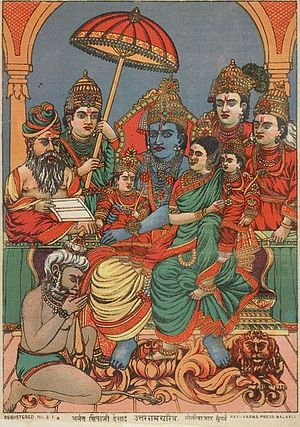Art and politics mingle at the Jaipur Literature Festival (JLF), where contemporary issues see a testing ground. This year’s audience is engaged in the debate surrounding the controversial demolition of the Babri mosque in Ayodhya in 1992 and the ensuing attempt by the now-ruling Bharatiya Janata Party (BJP) and its Hindu nationalist affiliates to whip up passion for building a temple in the name of the Hindu god Rama. Per their beliefs, Rama was born in the eastern city and in the very place where the demolished mosque once existed.
In 1992, after a long political campaign to mobilize Hindus in the name of the religion, right-wing forces, under the leadership of the BJP, razed the 16th century mosque. The ruling party emerged on the national scene after the episode and managed to capture power in New Delhi six years later. Once the party tasted power, it forgot the issue of the Rama temple, but periodically kept on raising the issue when its political stock plummeted.
These days, we’ve arrived at such a moment and the party is discussing the issue again. This is happening at a time when the crucial state of Uttar Pradesh, where Ayodhya is located, is preparing for elections next year and when Prime Minister Narendra Modi’s popularity is trending downward.
The JLF dedicated one session to discussing The Ramcharitmanas, a sacred book narrating the life of Rama. The panelists did not talk about the protagonist of the book, but how the text, particularly in northern and eastern India, used to be celebrated regardless of faith. Ashok Vajpayee, a popular Hindi poet, who moderated the panel, said that people used to remember the lines of the book regardless of faith or caste in earlier times. Rama was not understood just as a Hindu god, but as someone who was liked by everyone.
However, Harish Trivedi of Delhi University rued that “Rama has been abducted” now by majoritarian political forces. Instead of remaining a universal figure, Trivedi continued, he has been turned into a divisive icon. Trivedi’s remarks were met with applause from the more than 2,000 participants, who listened to the discussion with rapt attention. For many of them, it was their first time witnessing a discussion of Rama with little political coloring.
“For me, it was an eye opener of a session where I came to know how politics ruined the sanctity of the Ramcharitmanas and made Rama a divisive figure,” says Archana, a graduate student from a local university.
Describing the historicity of the text, Trivedi said that Tulsidas, the author, composed Ramcharitmanas in the second half of the 16th century, when the Mughal emperor Akbar was ruling the country. Akbar never interfered with the composition of the epic. Trivdei added that Tulsidas, who survived on alms, slept inside the Babri mosque when he was writing the book and never questioned the legitimacy of the existence of the mosque.
Philip A. Lutgendorf, a professor of Hindi and Modern Indian Studies at the University of Iowa, who was the main guest at the session, seconded the opinions of his fellow panelist. He has worked extensively with the Ramcharitmanas and his English translation, published by the Murty Classical Library of India, runs into seven volumes. The American scholar has spent much time in Ayodhya and Varanasi, the two places where Tulsidas traveled to write his work. Well versed in local languages like Awadhi and Hindi, Lutgendorf feels the pain of a gradual decline in people’s interest in local culture and language. He also laments the politicization of what should be, in his view, the domain of culture and history.
Lutgendorf, however, avoided making any politically loaded comments himself. Other panelists were quite scathing in their observations on the current political debate in the country. Coming down heavily on those who have been trying to appropriate Rama for their own political agendas, Trivedi said that “Rama isn’t just a religious concept. He cannot belong to one group of people. What happened in 1992 was not Rama’s fault. Someone else was responsible.”
He added that “those of us who do not believe in that ideology bear the responsibility of not letting a group of people set off with the rich poetic tradition of the Ramcharitmanas. It is our responsibility to separate the political from the cultural and to emphasize the importance of the latter.”
The current political atmosphere does not favor a separation of art and culture from politics. The panelists were also critical of the government’s attempt to historicize Rama. They argued that Rama exists in people’s beliefs and faiths; he does not need to be historicized and made to look human. The panel agreed that Rama must be rescued from the clutch of Hindu fundamentalist forces. Instead, he should be restored in the popular consciousness of Indian society where everyone — regardless of caste or faith — feels proximity with the Hindu god.

































